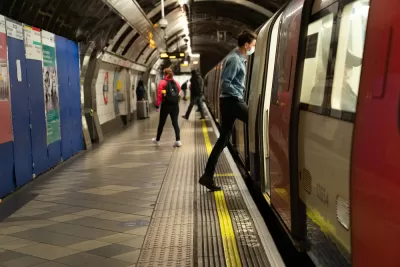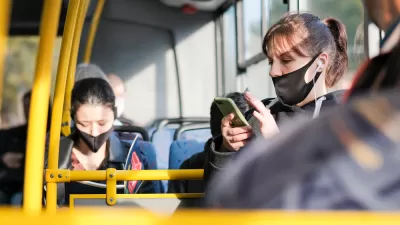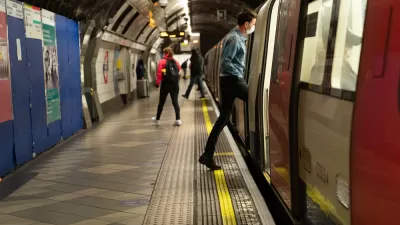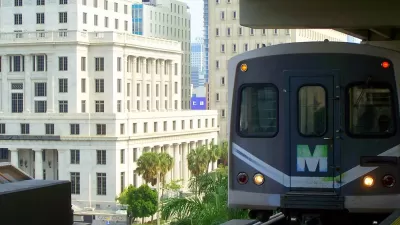With ridership at record lows and agencies struggling to stay afloat, public transit around the world will need robust investment to recover after the pandemic.

After a year of coronavirus lockdowns and a massive shift to remote work, public transit systems around the world are seeing plummeting ridership and revenue, leading to cuts and layoffs. The London Underground, one of the world's busiest systems, has been operating at around 20 percent of its usual capacity.
Somini Sengupta, Geneva Abdul, Manuela Andreoni, and Veronica Penney argue in the New York Times that declining transit ridership spells disaster for our collective efforts to address climate change. "Public transit offers a relatively simple way for cities to lower their greenhouse gas emissions, not to mention a way to improve air quality, noise and congestion." Now, "transportation experts are scrambling to figure out how to better adapt public transit to the needs of riders as cities begin to emerge from the pandemic" and counter the trend of private vehicle purchases.
Transit agencies face a monumental challenge. "If commuters shun public transit for cars as their cities recover from the pandemic, that has huge implications for air pollution and greenhouse gas emissions. Most importantly, if transit systems continue to lose passenger fare revenues, they will not be able to make the investments necessary to be efficient, safe and attractive to commuters."
The challenge for cities, write the authors, is to maintain and improve public transit systems now so that riders will eventually return. "People will feel more comfortable traveling in a new modern public transit system," said Mohamed Mezghani, head of the International Association of Public Transport. "It’s about perception in the end."
FULL STORY: Riders Are Abandoning Buses and Trains. That’s a Problem for Climate Change.

Alabama: Trump Terminates Settlements for Black Communities Harmed By Raw Sewage
Trump deemed the landmark civil rights agreement “illegal DEI and environmental justice policy.”

Planetizen Federal Action Tracker
A weekly monitor of how Trump’s orders and actions are impacting planners and planning in America.

The 120 Year Old Tiny Home Villages That Sheltered San Francisco’s Earthquake Refugees
More than a century ago, San Francisco mobilized to house thousands of residents displaced by the 1906 earthquake. Could their strategy offer a model for the present?

Ken Jennings Launches Transit Web Series
The Jeopardy champ wants you to ride public transit.

BLM To Rescind Public Lands Rule
The change will downgrade conservation, once again putting federal land at risk for mining and other extractive uses.

Indy Neighborhood Group Builds Temporary Multi-Use Path
Community members, aided in part by funding from the city, repurposed a vehicle lane to create a protected bike and pedestrian path for the summer season.
Urban Design for Planners 1: Software Tools
This six-course series explores essential urban design concepts using open source software and equips planners with the tools they need to participate fully in the urban design process.
Planning for Universal Design
Learn the tools for implementing Universal Design in planning regulations.
Clanton & Associates, Inc.
Jessamine County Fiscal Court
Institute for Housing and Urban Development Studies (IHS)
City of Grandview
Harvard GSD Executive Education
Toledo-Lucas County Plan Commissions
Salt Lake City
NYU Wagner Graduate School of Public Service





























